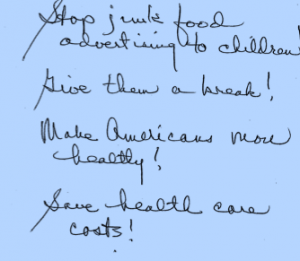
Score another round for junk food marketing. Just weeks after Congress turned back US Department of Agriculture efforts to make the school lunch program more healthful, today Congress delayed attempts at finalizing voluntary guidelines for food marketing to children.
Some background -- a year and a half ago, the Obama administration set in motion an effort to establish guidelines around the kinds of foods and drinks that can be marketed to children. The effort was to be voluntary, not regulatory, and the goal was to help combat childhood obesity, now hovering around 20 percent for six to 19-year-olds. But, not surprisingly, the food and beverage industry has been fighting hard against the proposal. Today, public health advocates were set back when Congress asked for a cost/benefit analysis of the proposed guidelines.
As The Washington Post reports, the cost-benefit requirement is buried in the huge spending bill Congress was debating today, the omnibus bill needed to keep the federal government running.
The administration’s proposal aims to tackle childhood obesity by having the industry market to children only those foods and drinks that make a “meaningful contribution” to a healthful diet and limit sodium, fats and added sugars. Foods that do not meet the guidelines could not be advertised to children.
The administration has stressed repeatedly that the plan is voluntary and meant to serve only as a guideline. But the industry says the initiative amounts to a backdoor regulation that will in effect wipe out advertising to children, eliminate millions of jobs and infringe on commercial free speech.The spending bill rider bars the Federal Trade Commission, the lead agency on the food marketing initiative, from spending money on finalizing the proposal until the agency and its partners comply with an executive order signed in January by President Obama.
But the President's executive order is about regulations, not voluntary efforts. Margo Wootan of the Center for Science in the Public Interest pointed out in a statement today, "There is no cost associated with something that is totally voluntary."
Lori Dorfman, co-chair of the Food Marketing Workgroup, a national coalition of organizations and experts in support of the guideline, said from her office in Berkeley today that she was "bitterly disappointed" by the Congressional roadblock. "What's frustrating here," she continued, "is that Congress listened to industry instead of parents and the American public."